Fueled by Donald Trump opponents, Rachel Maddow’s popularity rises
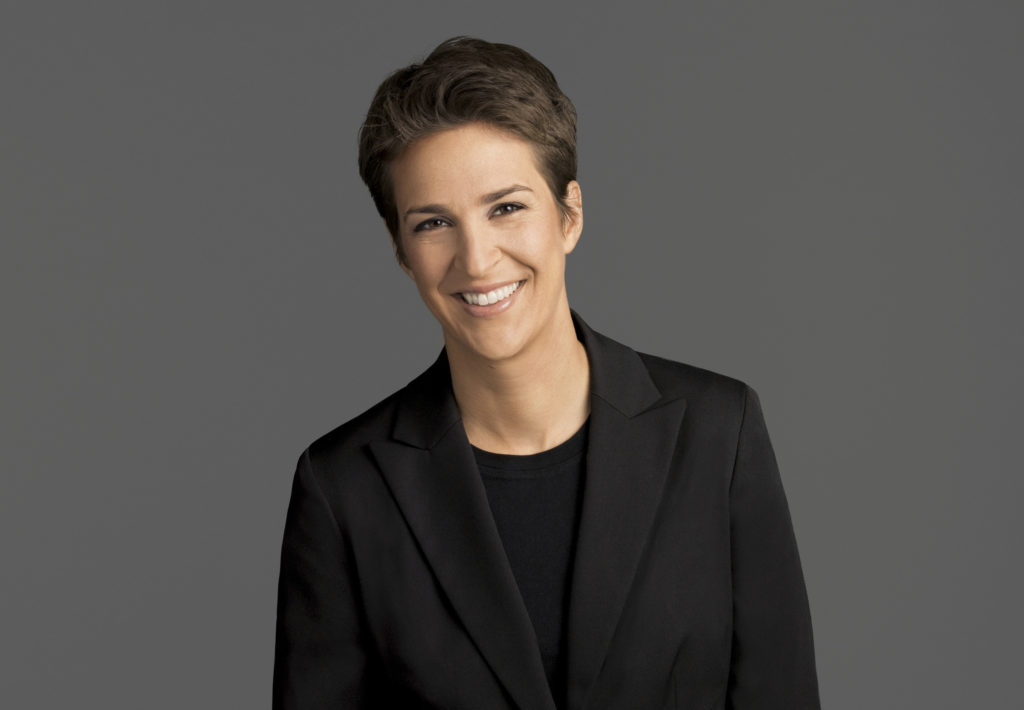
Rachel Maddow can trace the mood of her audience by looking at the ratings. Her MSNBC show’s viewership sank like a stone in the weeks following Donald Trump‘s election, as depressed liberals avoided politics, and bottomed out over the holidays. Slowly, they re-emerged, becoming active and interested again. Maddow’s audience has grown to the point where February was her show’s most-watched month since its 2008 launch. Maddow has emerged as the favorite cable news host for presidential resistors in the opening days of the Trump administration, just as Fox News Channel’s Sean Hannity is one for supporters or Keith Olbermann was the go-to television host for liberals in George W. Bush‘s second term. Trump fascination has helped cable news programs across the political spectrum defy the traditional post-presidential election slump, few as dramatically as Maddow’s. Her show’s average audience of 2.3 million in February doubled its viewership over February 2016, in the midst of the presidential primaries, the Nielsen company said. “I’m grateful for it,” Maddow said one recent afternoon. “It is nice for me that it is happening at a time when I feel we are doing some of our best work.” Those two things — ratings success and Maddow’s pride in the work — don’t always intersect. “We’re making aggressive editorial decisions in terms of how far we’re willing to get off of everyone else’s news cycle,” she said, “but it’s paying off because the news cycle more often than not is catching up with us after we do something.” Maddow has decided to cover the Trump administration like a silent movie, so the show could pay more attention to what is being done rather than what is being said. The central focus is on connect-the-dots reporting about Trump’s business interests and dealings with Russia. Her show is a news cousin to HBO host John Oliver‘s “Last Week Tonight” in its willingness to dive into complex subjects that don’t seem television-friendly, and follow the stories down different alleys. Maddow sounds long-winded when it doesn’t work. When it does, it’s like an absorbing novel stuffed with characters. “It’s not like I am a teacher who is trying to extend the attention span of the American news viewer,” said Maddow, a Rhodes scholar. “I have no goal of trying to privilege complexity. It just so happens that I tend to think in 17-minute bursts.” Maddow said she and her staff try to break news, like reporting on a Department of Homeland Security report on Trump’s immigration policy, and she was aggressive in bringing the Flint, Michigan, water crisis to a national audience. More often than not, she sees her role as explaining how things work. The program spent considerable time last week on a New Yorker magazine piece about foreign investments by Trump’s real estate company. She’s determined not to get lost in the noise, particularly since she believes Trump is skillful at distracting the media with a new story — even an unflattering one — when he doesn’t like the attention being paid to another. “I pray for the day when the most important thing about the Trump administration is that the president said something inappropriate on Twitter,” she said. “There are bigger and more valuable stories to be chasing than that.” When some news organizations were upset at being barred from an informal press briefing held by White House Press Secretary Sean Spicer two weeks ago, Maddow understood why. But the story didn’t really interest her. Since she doesn’t trust much of what the administration says, Maddow wondered what these reporters were really missing by not being there. “Her approach to reality and the president’s couldn’t be further apart,” said Jeff Cohen, an Ithaca University professor and liberal activist. During busy news periods, “certain voices cut through,” said NBC News Chairman Andrew Lack. “And her work is so consistently strong. She doesn’t disappoint, and she’s got a work ethic that is consistently off the charts. … She is a very original and unique voice.” While Maddow delivers opinion pieces instead of straight news, they are well-informed, he said. Lack doesn’t see Maddow as a voice of the resistance. Neither does she. “People want to draft me as an activist all the time, ascribe that role to me,” she said. “I’m not. The reason I know I’m not is that I stopped doing that in order to be the person who explained the news and delivered the news instead. It’s a very clear line to me.” Republished with permission of The Associated Press.
Updates from the 1st presidential debate

The Latest on the first of three presidential debates between Democrat Hillary Clinton and Republican Donald Trump (all times EDT): 10:45 p.m. Both candidates concluded the first presidential debate by saying they will accept the outcome if the other wins. Hillary Clinton spoke directly to viewers and said, “It’s not about us, it’s about you.” Donald Trump initially dodged the same question, saying he would make a “seriously troubled” America “great again.” He added: “I’m going to be able to do it. I don’t believe Hillary Clinton will.” But Trump finished his answer by saying that if Clinton wins, “I will absolutely support her.” ___ 10:43 p.m. Hillary Clinton is punching back at Donald Trump’s assertions that she doesn’t have the “stamina” to be president. Trump has questioned whether Clinton has the physical fitness to be president and he repeated the criticism to her directly during the debate. Clinton’s response? Trump shouldn’t talk about stamina until he’s tried out the busy schedule she kept up as secretary of state. Trump didn’t answer moderator Lester Holt’s original question about his past comments that Clinton doesn’t have the “presidential look.” Clinton suggested the remarks were about gender, and she reminded the crowd of Trump’s past comments calling women “pigs” and other derogatory names. ___ 10:42 p.m. Donald Trump says NATO needs to “go into the Middle East with us” to combat the Islamic State group. And he is taking credit for NATO focusing resources on combating terrorism. In fact, the alliance agreed in July to contribute aircraft and conduct training in Iraq and has increased intelligence coordination there. And NATO set up an anti-terrorism program in 2004 — years before Trump criticized them as a presidential candidate. Earlier this year, Trump criticized NATO for not focusing on terrorism. He said that afterward, he saw an article reporting that NATO was opening a new, major anti-terrorism division. He said Tuesday that NATO’s action was “largely because of what I was saying, and my criticism of NATO.” ___ 10:40 p.m. Donald Trump is avoiding a specific declaration on how he would use nuclear weapons if he’s elected president. The Republican nominee said during the first presidential debate that he “would not do first strike” because “once the nuclear alternative happens, it’s over.” That statement suggests he would not authorize a nuclear attack unless the U.S. was struck first. But in the same answer Trump said he “can’t take anything off the table.” He mentioned adversary nations such as North Korea and Iran. President Barack Obama has considered changing existing policy to state clearly that the United States would not deploy nuclear weapons without first being attacked by nuclear weapons. But he met resistance and has elected not to make such a shift. ___ 10:38 p.m. Hillary Clinton is accusing Donald Trump of being too easily provoked to keep the United States from going to war — perhaps even one involving nuclear weapons. Trump says: “I have much better judgment than she does. I have much better temperament.” That drew laughs from some in the debate crowd, and prompted Clinton to exclaim: “Woo! OK!” Clinton then pivoted to policy, defending the U.S.-led war in Afghanistan. Clinton said Iran was “weeks away” from a nuclear bomb when she became secretary of state — and says the Obama administration thwarted that progress. She continued that Trump didn’t have “good judgment or the right temperament” because he could take the country to war over small issues, like being mocked on Twitter. ___ 10:35 p.m. Donald Trump is continuing to insist he opposed the Iraq War before the U.S. invasion despite evidence to the contrary. Trump says during the debate that he “did not support the war in Iraq,” calling that charge “mainstream media nonsense.” But there is no evidence Trump expressed public opposition to the war before the U.S. invaded. Trump was asked in September 2002 whether he supported a potential Iraq invasion in an interview with Howard Stern. Trump briefly hesitated, then responded: “Yeah, I guess so.” Presented with the comment during the debate, Trump responds: “I said very lightly, I don’t know, maybe, who knows.” He’s also telling reporters to call Fox News host Sean Hannity to confirm private conversations he said they had about the war. Hannity is a top Trump supporter. Clinton voted in favor of the invasion in 2002 while she was a New York senator. She has since said it was a mistake. ___ 10:27 p.m. Donald Trump is interrupting the moderator of the first presidential debate to insist he has the best temperament for the office. Trump repeatedly made the assertion after clashing with moderator Lester Holt over his early support for the Iraq War. Then he segued to his temperament. “I think my strongest asset by far is my temperament,” Trump said. “I know how to win.” Clinton and her allies have repeatedly hit Trump over his temper and inability to take criticism. ___ 10:23 p.m. Hillary Clinton says one key to fighting terrorism in the United States is working closely with Muslims living here. Clinton says Donald Trump has “consistently insulted Muslims abroad, Muslims at home.” She says Muslim people can provide information that law enforcement may not be able to obtain anyplace else. Both candidates were asked to explain how they would combat terrorism in the U.S. Clinton says her plan includes an intelligence surge to obtain “every scrap of information” and to “do everything we can to vacuum up intelligence from Europe, from the Middle East.” ___ 10:20 p.m. Hillary Clinton says defeating the Islamic State group and taking out its leaders would be a top priority as president. Clinton says she’s hopeful the Islamic State group would be pushed out of Iraq by the end of the year. She says the U.S. could then help its allies “squeeze” the terrorist group in Syria. Clinton says she would do everything possible to take out the group’s leaders, and make that one of her administration’s organizing principles
Diane Roberts: Donald Trump feels presidency is ‘man’s job’
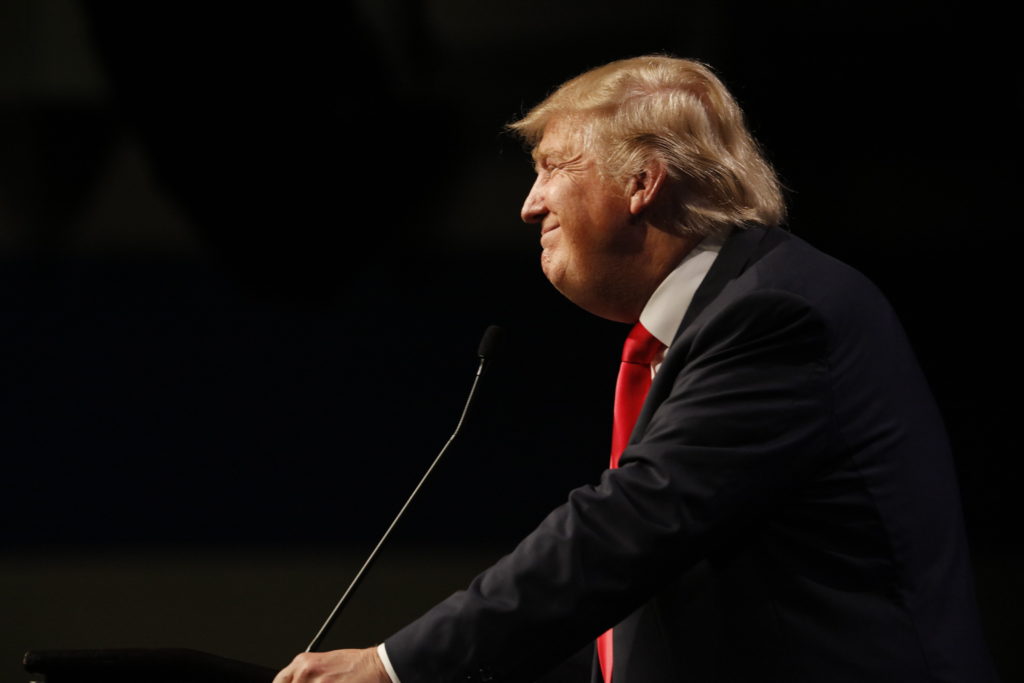
Hillary Clinton is sick. Important white men-types, such as Rudy Giuliani, Sean Hannity and Donald Trump, say so. She sits down at some of her campaign appearances — ON A STOOL! Or with a PILLOW BEHIND HER BACK! Clearly, her spine is disintegrating before our very eyes. She has Parkinson’s. A blood clot. A brain tumor. She has no stamina. She’s feeble. She has fits, seizures, rolling her eyes around and laughing. Or she’s possessed by demons. Giuliani, now: there’s an hombre! His intellect is so honed, so energetic, so like a cheetah about to pounce on a gazelle, that at a recent campaign event, he forgot 9/11. Which happened while he was mayor of New York. Last week, he praised Republicans thus: “Under those eight years before Obama came along, we didn’t have any successful radical Islamic terrorist attack in the United States. They all started when Clinton and Obama got into office.” Giuliani’s been all over television, insisting that the press ignores the obvious fact that Clinton is Not Long for This World. Trump spokesperson Katrina Pierson, she of the necklace made of bullets and the assertion that “Obama invaded Afghanistan,” went on CNN and concurred: she diagnosed Clinton with “dysphasia,” a language disorder resulting from brain damage. You will have noticed that Hillary Clinton can barely string three words together while Pierson’s boss is a silver-tongued master of Ciceronian rhetoric. Donald Trump says Clinton sleeps all the time. She takes “too many naps.” Trump only needs three or four hours of shut-eye. No naps. He says himself: “no naps for Trump!” Only losers and weaklings nap. But here’s the thing about womenfolk: they are always sick. When they’re young, the monthly cycles make them moody and weird. When they get pregnant, the rampant hormones invade their brains, turning them pretty much crazy. Then it’s the menopause, attacking what little rationality they have left. After that, it’s downhill into dementia. You can’t allow one of them to become the most powerful person on the planet. There was a movie about this very thing: it came out in 1964 and was called “Kisses for My President,” Polly Bergen plays the first woman president; Fred MacMurray is her husband, the First Gentleman. What ensues is, to put it in Trumpian terms: A Disaster! Madam President spends so much time on working with Congress, containing dangerous dictators and dealing with the Russians, she doesn’t even notice that her daughter’s running around with an unsuitable boy, and her emasculated husband, installed in an office with ruffled curtains and other girlie stuff, nearly runs off with an old flame. It’s chaos. Until one day this bad mother of a president faints, and it is revealed she’s pregnant. She resigns (because hormones, obvs) and the natural order is restored. There’s a reason why American women were not allowed to vote until 100 years ago (the anniversary of the 19th Amendment’s final passage is Aug. 26), despite all that stuff about equality and democracy in our founding documents. Because they’re weak. Their uteruses tell them what to do. They get hysterical — that’s from the Greek word for uterus! They’re not strong-minded. Peter Thiel, the gazillionaire founder of PayPal and Trump delegate, thinks it’s a pity women ever got the franchise, since they turn around and vote for welfare, disaster relief, the environment, other women. Bunch of suckers. Or else they’re unfeminine. When Donald Trump divorced his first wife Ivana, he said it was because she no longer had her “softness.” She’d become “an executive, not a wife.” Trump left her, as he told Vanity Fair magazine, for “a piece of ass — a good one!” but when the POA (AKA Marla Maples) took to working outside the home, he balked again: “When I come home and dinner’s not ready, I go through the roof.” Yeah, women are just too emotional and petty to be president. Especially Hillary Clinton. A female Trump voter at a recent rally clarified it for Daily Show reporter Jordan Klepper and the rest of us: “The presidency is a man’s job,” she said. “A female has more hormones she could start a war in 10 seconds.” Ladies, don’t you just want to go lie down? Maybe take a Valium? ___ Diane Roberts’s book “Tribal: College Football and the Secret Heart of America” will be out in paperback this fall. She teaches at FSU.
Fox’s Sean Hannity at center of bitter campaign competition
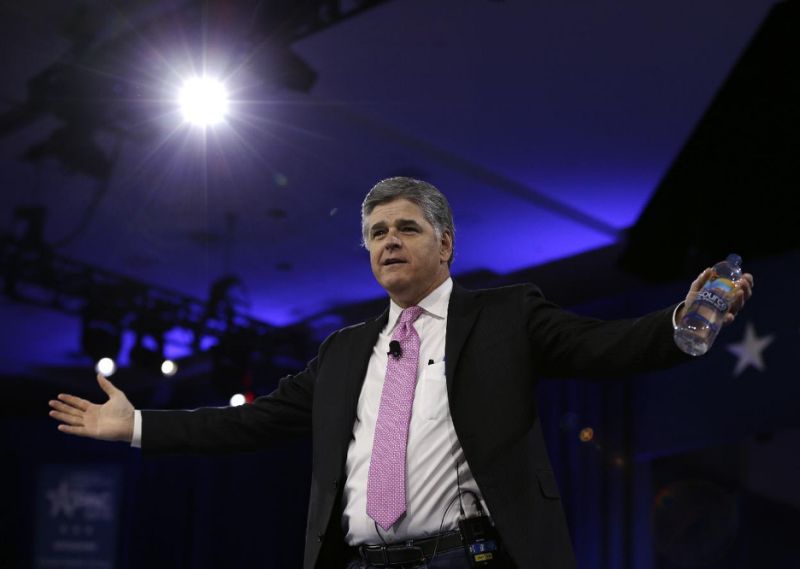
Sean Hannity is getting a bruising reminder that this year’s presidential campaign defies traditional political rules. The Fox News Channel and radio host had a nasty spat with Sen. Ted Cruz this past week, following criticism from both the left and right about his interviews with Donald Trump. Fox also aired the odd spectacle of Hannity sitting onstage with Trump as an audience booed lustily at the mention of Fox colleague Megyn Kelly‘s name. In an election year when cable news networks are enjoying a bump in viewership, Hannity is a key man for Fox, and his audience is growing more quickly than Kelly’s and Bill O’Reilly‘s. They precede Hannity in Fox’s prime-time lineup. Fox declined to make Hannity available for an interview for this story. Hannity’s relationship with Trump became an issue when the liberal website Thinkprogress.org published a story that wondered how Hannity had been able to interview Trump so much without making news, and quoted exchanges that depicted a friendly relationship. Trump had been a guest on Hannity’s Fox show 32 times before last week’s town hall in Pittsburgh, according to the host’s records. Hannity has said on his radio show that he does not support one Republican over another. The attack didn’t seem to surprise Hannity, who noted the website’s ties to Hillary Clinton supporters. The story, however, was picked up and amplified by the conservative, anti-Trump website Redstate.com. During Hannity’s recent Trump interview, he pressed for specifics on how the candidate would help people economically in that part of the country and how his Mideast policies would differ from President Barack Obama‘s. About Trump’s claims that some delegates were being snatched, Hannity said, “Clearly there are people who want to circumvent and disenfranchise the voters. What do you say to them?” He asked him to detail Clinton’s weaknesses, and there was an uncomfortable moment where he asked Trump to reveal what unflattering nickname he would try to stick on Clinton like he did with “Lyin’ Ted” Cruz. Trump wouldn’t say, but promised Hannity he’d be the first to know. By Hannity’s count, Cruz had appeared on his television show 34 times since Cruz announced his candidacy. Ohio Gov. John Kasich, still in the race, and Kentucky Sen. Rand Paul, who is not, had been on the show 20 times, with Florida Sen. Marco Rubio, another dropout, making 19 appearances. On his radio show, through last week, Cruz had logged more interview time than any other candidate — more than 188 minutes on the air. Trump’s 112 minutes were third behind Rubio. “I’m just going to remain neutral and give you access to the candidates, because no one else is doing it,” Hannity said. “At the end of the day, if it’s Cruz or Trump who is the nominee, I’m going to support them because it would be a disaster if Hillary Clinton becomes president.” When Cruz this past week seemingly made a reference to Hannity’s critics in a radio interview, the host flashed annoyance. After Cruz called a Hannity question about the fight for delegates part of a silly media obsession, Hannity pressed the point. “The only people asking this are the hard-core Donald Trump supporters,” Cruz said. “You’ve got to stop,” Hannity replied. “Every time I have you on the air and I ask you a legitimate question, you throw this in my face, and I’m getting sick of it. I’ve had you on the air more than any other candidate.” The unabashed conservative makes no secret of his views, and he appeals to a like-minded audience. In last week’s Trump interview, when Hannity asked about the candidate’s private meeting at Trump Tower with Kelly on April 13, the pro-Trump crowd booed at the mention of her name. Kelly has come under constant criticism from Trump since she asked him a question he didn’t like last summer. Neither man spoke about the audience’s reaction. Trump smiled. Hannity, who was largely off camera, appeared to make a “stop” motion with his arms. It was an audible manifestation of a delicate problem for Fox. Kelly, Fox’s brightest new star, has come under relentless criticism from Trump, and many Hannity fans are siding with the GOP front-runner instead of the network long loved by Republican viewers. Given that Trump seems to feel comfortable on Hannity’s show, the veteran talk show host is an important asset for Fox in a combustible campaign. Republished with permission of the Associated Press.
Donald Trump says ads are coming to early-voting states
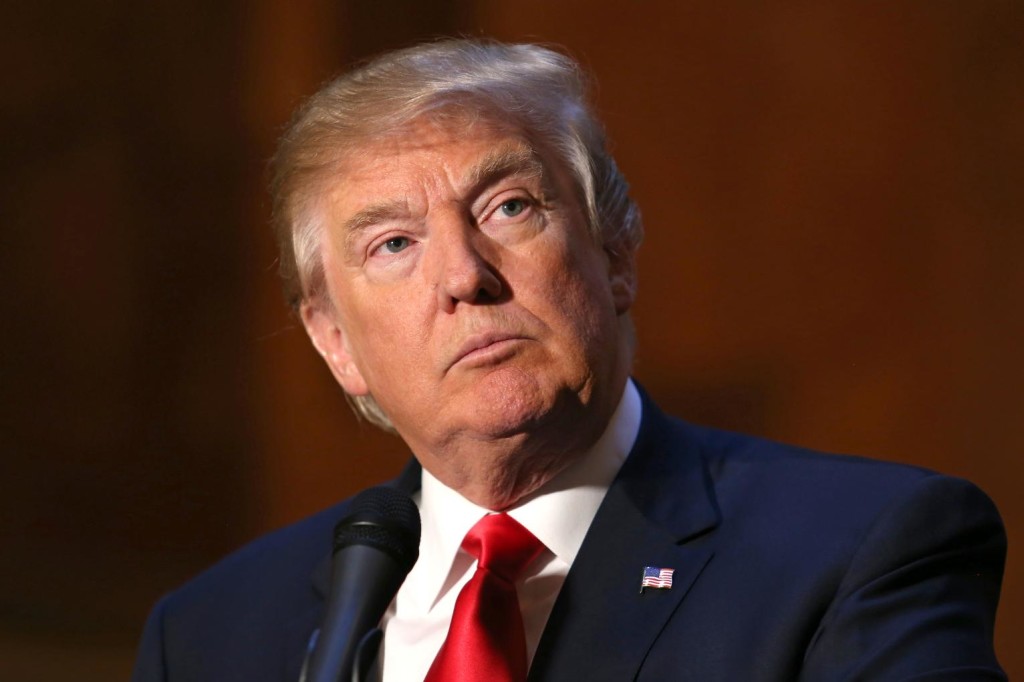
Republican presidential candidate Donald Trump says he’s finally planning to put some money on the line as several of his rivals receive new attention and support. The billionaire businessman, who has so far relied on the news media to promote his unorthodox campaign, said in an interview Tuesday night on Fox News that his campaign will begin paid advertising soon in the first states to vote in the GOP nomination race. “We’re going to start some ads, I think, over the next two days,” he said in the interview with Fox’s Sean Hannity. “Certainly in Iowa, we’re going to start ads, and in New Hampshire and, I think, in South Carolina, too. So, we’re going to start advertising a little bit.” Trump’s campaign did not immediately respond to a request for more details about the timing or how much Trump planned to spend. His campaign had not reserved any television advertising time as of Tuesday, according to Kantar Media’s CMAG advertising tracker. Trump said in early October that he had ads in the works, but in the weeks since has said he didn’t think they were necessary given how much attention he’s already given and the potential for Trump overload. Despite Trump’s boasting that he self-funds his campaign, the vast majority of the cash he has spent so far has come from donor contributions. Still, he has spent far less than many of his rivals — thanks, he’s said, to the fact that he hasn’t had to spend millions on paid ads. “I was going to have spent $25 million by this time. I’ve spent nothing. I feel guilty because I’ve spent nothing ’cause, we haven’t needed it,” he said Tuesday. “But we’re going to start spending a little bit of money over the next three or four weeks.” Trump dominated opinion surveys throughout the summer, but several of his rivals have been garnering new attention from voters and donors this fall. To those who may be thinking about going after him with negative ads, he added a warning. “Look, anybody that hits me, we’re going to hit them 10 times harder,” he said. “We’re going to just dollar-for-dollar, we’re going to go after them. We have more money than anybody else by a factor of about 1,000.” Republished with permission of the Associated Press.
Dominating TV, Donald Trump a ratings draw
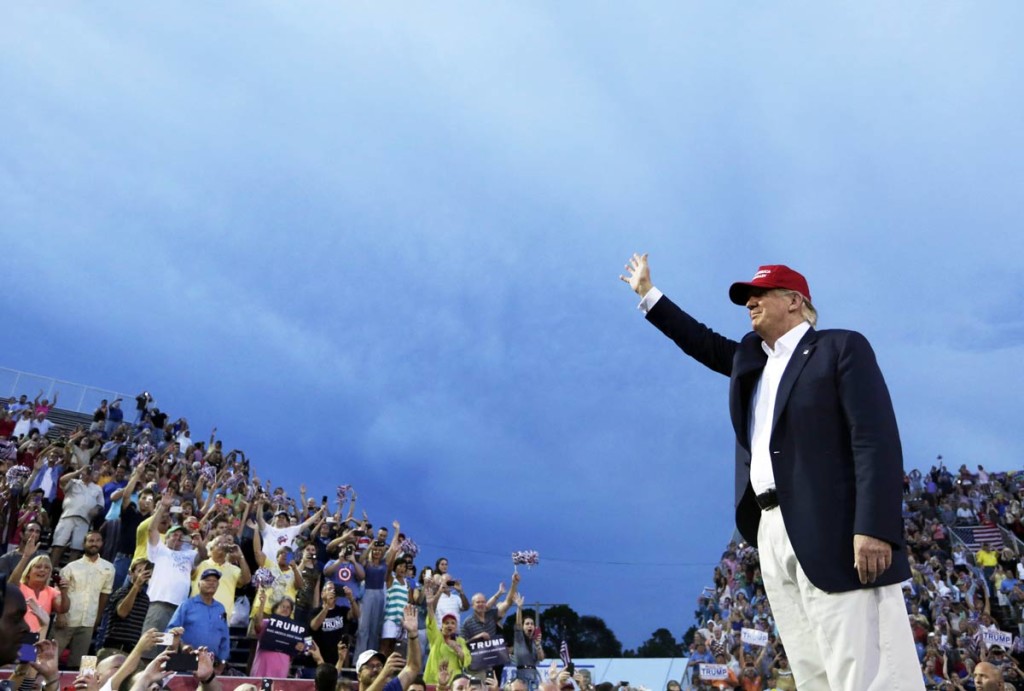
Opinion polls are one thing, but Nielsen numbers speak more loudly to television executives: Republican presidential frontrunner Donald Trump‘s ability to pull in viewers makes him catnip for news programs and wins a level of coverage that feeds on itself. NBC’s “Meet the Press” had its biggest audience in more than a year for its Trump interview on Aug. 16, leading that show’s biggest competitors — ABC’s “This Week” and CBS’ “Face the Nation” — to feature phone interviews with the New York businessman this past Sunday. After CNN turned Jake Tapper‘s interview with Trump into a prime-time special last week and earned its best ratings at that hour in a month, the network repeated it two nights later. Two Trump interviews on Sean Hannity‘s Fox News Channel show this month both brought in around 2.2 million viewers, well above his typical audience. Trump is generally considered the biggest reason why Fox reached a startling 24 million people for the first GOP presidential debate earlier this month — the most watched program in Fox News history. That instantly made him a big “get” for TV producers, and the media savvy ex-reality show host has eagerly played along. Keenly aware of his drawing power, Trump suggested in a Time magazine interview that he could ask CNN to pay $10 million to charity for his participation in the next GOP debate. “He’s getting a lot of attention that he should get because he’s doing so well in the polls and he’s getting a lot of attention because he’s Donald Trump, and you never know what he’s going to say,” said David Bohrman, a television consultant and former CNN Washington bureau chief. “It’s not negligence to cover him,” he said. Aware of that drawing power, cable news outlets cover Trump events with an intensity the other 16 Republican candidates can only envy. A town hall meeting in New Hampshire last week drew live coverage. CNN and Fox News both cast aside regular programming Friday to pick up Trump speaking at a rally in Alabama. Trump’s unpredictability is a bonus. His critical comments about Fox’s Megyn Kelly for her debate questions, made during an interview with CNN’s Don Lemon on what would normally be a sleepy August Friday night, put that show in headlines for the entire weekend. Viewership during the seven call-in interviews that Trump has given to MSNBC’s “Morning Joe” since June 18 rose 22 percent from what the talk show averaged 10 minutes prior to his call, the Nielsen company said. On July 24, the size of the audience jumped 47 percent in only a few minutes when Trump spoke. Danny Shea, editorial director of The Huffington Post, compared the attention news networks are giving to Trump to CNN’s non-stop coverage of the missing Malaysian airliner last year. He was on “Morning Joe” last week to defend HuffPo’s declaration that it would only cover Trump’s candidacy in its entertainment section, a decision that grows harder to defend with each new poll. “There’s an open secret that (Trump’s campaign) is a joke and a spectacle,” Shea said, “and by going wall-to-wall on it you’re just legitimizing it.” Morning Joe co-host, Joe Scarborough, rejected the argument that Trump had more ratings than news value. During off-the-air meetings, “nobody ever says, ‘OK, Donald Trump is great for ratings.’ What we say is, ‘what the hell is going on? Can you believe this? What is happening?’ He is a very real story, and the longer he stays in front, the more of a story he’s going to be.” In past campaigns, the media’s “invisible primary” gave bursts of early attention to candidates before voters settled things, to which Gary Hart, Howard Dean, John McCain, Jimmy Carter can attest. None matched Trump for attention, said Thomas Patterson, acting director of the Joan Shorenstein Center on the Press, Politics and Public Policy at Harvard University’s Kennedy School of Government. Only two months ago the GOP had a shapeless field of candidates, and now the non-Trumps are so starved for attention that some will struggle to survive until voting begins. Bohrman said Trump is getting a level of attention he normally doesn’t see until spring of an election year, when nominations are all but decided. “It’s kind of a ‘no time for losers’ policy in the newsroom,” Patterson said. Trump frequently mixes it up with the media, often through Twitter. Sometimes he’s playful, like suggesting that “Morning Joe” co-host Mika Brzezinski be paid more than Scarborough. Often he’s quite serious, and his reaction to Fox’s Kelly struck some who heard it as offensive. At the Alabama rally, Trump asked the audience what they thought of cable networks. Fox got cheers and MSNBC boos, making the latter network’s decision not to televise the speech live fortunate. At this point, it’s hard to tell how much attention Trump is receiving because he’s a frontrunner, and how much is because producers know he’ll provide a reliable ratings bump. “At the end, does it really matter if both are valid reasons for covering him?” Bohrman said. “There’s not a lot of other compelling stuff on television now. It’s the reality show of the season.” Republished with permission of the Associated Press.


